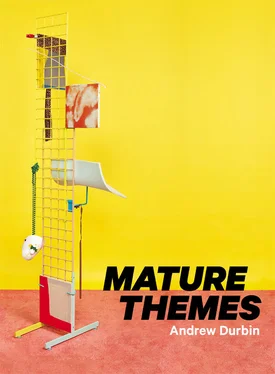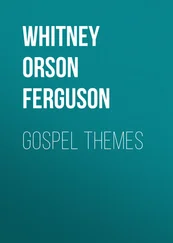Andrew Durbin - Mature Themes
Здесь есть возможность читать онлайн «Andrew Durbin - Mature Themes» весь текст электронной книги совершенно бесплатно (целиком полную версию без сокращений). В некоторых случаях можно слушать аудио, скачать через торрент в формате fb2 и присутствует краткое содержание. Год выпуска: 2014, Издательство: Nightboat Books, Жанр: Современная проза, на английском языке. Описание произведения, (предисловие) а так же отзывы посетителей доступны на портале библиотеки ЛибКат.
- Название:Mature Themes
- Автор:
- Издательство:Nightboat Books
- Жанр:
- Год:2014
- ISBN:нет данных
- Рейтинг книги:4 / 5. Голосов: 1
-
Избранное:Добавить в избранное
- Отзывы:
-
Ваша оценка:
- 80
- 1
- 2
- 3
- 4
- 5
Mature Themes: краткое содержание, описание и аннотация
Предлагаем к чтению аннотацию, описание, краткое содержание или предисловие (зависит от того, что написал сам автор книги «Mature Themes»). Если вы не нашли необходимую информацию о книге — напишите в комментариях, мы постараемся отыскать её.
is a hybrid text of poetry, art criticism, and memoir focused on the subject of disingenuity — and what constitutes "personal experience" both online and IRL when to "go deep" in a culture of so many unreliable communication technologies is to resend a text at 3 AM.
Throughout the book, Durbin’s voice mutates into others in order to uncover the fading specters of meaning buried under the pristine surfaces of art and Hollywood, locating below them the other realities that structure our experience of both.
Mature Themes — читать онлайн бесплатно полную книгу (весь текст) целиком
Ниже представлен текст книги, разбитый по страницам. Система сохранения места последней прочитанной страницы, позволяет с удобством читать онлайн бесплатно книгу «Mature Themes», без необходимости каждый раз заново искать на чём Вы остановились. Поставьте закладку, и сможете в любой момент перейти на страницу, на которой закончили чтение.
Интервал:
Закладка:
The night of Hurricane Sandy, I smoked a lot of pot, then looked at photos on Twitter of the flooding in the East Village, lower Manhattan, Queens, and Red Hook until the power went out, my phone died, and I passed out in my friend’s West Village apartment. (News of Staten Island and New Jersey hadn’t reached us yet.) The last thing I recall was another friend texting me to say that the city was evacuating the East Village in boats. Was that in my dream, I thought, the point where the present surpasses the expectations of history to bring about a future we were told we had propelled away? Windows blasted open. My favorite trees fell. The streetlights did not work when I was driven to Brooklyn two days later. This is what happens when you aren’t paying attention and, over the hill, a car arrives with bad news, news that seemed impossible but in retrospect was the only news you could have received. I fell on a pillow. In my dreams I woke and found that everything west of 6th Avenue had sunk into the Hudson, which was now the ocean. I rushed with the others to the shore to take a picture. I stood on the beach where the last part of 7th Avenue remained, staring at the dark waters of the new world splashing up against the old one. I remember taking the Staten Island Ferry one night, the height of the following summer, and in a rage throwing my glasses overboard. I remember reading that anecdote in Joe Brainard’s I Remember and thinking it was my life he’d remembered.
The prime directive of fantasy is aftermath. In A.I. Artificial Intelligence , the world is covered in ice, above which an alien species excavates the image of our future together. Our life in remains, trinkets, Coney Island, all of it submerged in water memory. There is no future that isn’t also an excavation of some present. In A.I. , aliens float past the twin towers of the World Trade Center. In the future, are they restored? If only Stanley Kubrick had lived to make his movie. He might have known that climactic precarity is an economics of gloom, predicated upon a system of consumption that, in our lives, became a hostility normalized in time. In my vision of the future, the resurrected Stanley Kubrick reshoots A.I. as a second parable of the contemporary moment. Since every science fiction is a reading of the period that produced it, the new movie ends with the robot boy discovering that his only job was to promote the male family member, hobbled by impotency, to his symbolic function as Father — and not to love and be loved in return. The boy is abstract wealth synthesized into a Haley Joel Osment-identified body, the cork in the void of loss. The aliens, who have come to earth to find us permanently lodged in the landscapes we made for ourselves, do not return him to the dream of family life in which the mother’s love is the focal point of his experience; rather they return him to the dream of labor. His mother greets him, then goes into her bedroom and locks the door. Landscapes are an economics. Toil over the earth as we always have and eventually it will toil over you. Will we meet in our mutual fantasy? Will I finally be your employer?
I once lived in a house in upstate New York owned by the disinherited son of the publisher of Penthouse . In the winter, the snow used to freeze level with the porch, which was raised about a foot up from the yard, creating the illusion that you could walk off it onto solid ground. Once, a friend stepped off the ledge, forgetting that he wasn’t walking out onto our yard, and fell forward and disappeared. In those days, winter was eternal. And I was the friend I’m telling you about.
In Los Angeles, I stayed with a friend who lived near a storage center for the Bureau of City Lights. When we walked to a nearby café, we passed by the fenced lot of the depot, which stretched an entire block. My friend suspected that it had been abandoned, but my friend is not always the most careful observer of his environment, so I couldn’t be sure if this was true or not. I was struck by the huge array of lamps lying on the ground, a scene that felt like an incidental rejoinder to Chris Burden’s Urban Light (2008) at LACMA. I read a news article recently about how LA is the city of the future because it is improving its mass-transit system. I think it is the city of the future because it takes the basic result of urban decline (i.e., decrepit infrastructure, abandoned buildings, deregulated public space) and uses it to propel itself forward. It plays its apocalyptic self-image against the plasticized glamour of Hollywood, producing a dissonance that one time gave me a panic attack while I walked through the public gardens in Pasadena with Kate Durbin. In this regard, one LA (there are many) seems to me designed as a science-fictional space, a patchwork of competing visions for how to structure our lives: into irrigated hills, domesticated flatlands, outer and inner social loops, transit brackets. In the future, the future will have ended, and the present will happen behind a velvet curtain in a nightclub at the bottom of Griffith Park.
In its comprehensive styling of known geography, Google Maps seeks the All only to find it cannot exist. Structured by the lack that a totalizing effort cannot contain, Google Maps is a matrix of fantasy and its correlatives, the between-space of representations of the real, altered and unaltered by Photoshop, a surveillance technology designed to render a fixed image of a changing field. In some time down the line, when certain landscapes erode beyond recognition, the most convincing evidence of their former existence will probably be Google Maps. I’m not a futurist except in this regard. Later, with a multitude of mapping technologies that will eventually render it obsolete, the original map will itself become a kernel of the real, distorting our perception of everything that we experience when we experience the so-called natural. Together we will watch the present unfold from afar. Glaciers, snowy mountains, fields: we will understand them only in terms of our seeing them represented online, consigned to the archive because their original, transitional form will have entered a delay between phenomenon and absence. I mean to say that these things are going away. Of course the bison we watch in northern Montana should graze free of our having to see them to know they had ever been there at all, but that isn’t the case.
language is landscape
every word dissipates into its mountains
valleys and oceans
Laurie Anderson once said
virtual reality
will never be convincing
until it has some dirt in it. This is also true for writing
base unit preference: the vowel over consonant
consonants are buildings; vowels their foundation
vowels and consonants are organized
into words organized into commands
language is weather, too. The water came up to 20th street
and 10th avenue in Chelsea
at the height of Hurricane Sandy’s
storm surge
I played a drinking game until the power went out:
one shot of whiskey for every time
the CNN newscaster said “surge.” Thirteen-foot surge
drink
higher than expected storm surge
drink
the East Village was evacuated in boats
Long Island, Staten Island were partially destroyed
in the surge
drink. What does not change /
drink
You are fugitive. I am reverie!
No mistake is made without permission first. At sea, I have been this, with you, thrown into the pile of things moving across us in rhizomatic bliss. Do you remember the early passage in Joe Brainard’s I Remember where he describes throwing his glasses off the Staten Island Ferry? To reinforce blindness with behavior, I return to this moment so often because I have thrown my glasses into the harbor, too. Melancholy, even in its most cloudlike state, is never invisible to others; it is only ever abstracted to its absolute and most potent normalcy until it becomes the environment you exhaust yourself in. Like taking a train upstate midsummer to be by yourself and finding that the entire train is full of people doing the same thing. Pollution is extradition of the everyday, detritus scattered across the mechanisms that create daily life in the first place. Joe Brainard washed ashore of this landscape, among the floating nuances of newly depleted resources like love, kindness, memory. How many modes of production can we fit into this sentence? Disaster is tremendous and overwhelmingly narrow in its concern. Can you name it? And does its name stick?
Читать дальшеИнтервал:
Закладка:
Похожие книги на «Mature Themes»
Представляем Вашему вниманию похожие книги на «Mature Themes» списком для выбора. Мы отобрали схожую по названию и смыслу литературу в надежде предоставить читателям больше вариантов отыскать новые, интересные, ещё непрочитанные произведения.
Обсуждение, отзывы о книге «Mature Themes» и просто собственные мнения читателей. Оставьте ваши комментарии, напишите, что Вы думаете о произведении, его смысле или главных героях. Укажите что конкретно понравилось, а что нет, и почему Вы так считаете.











